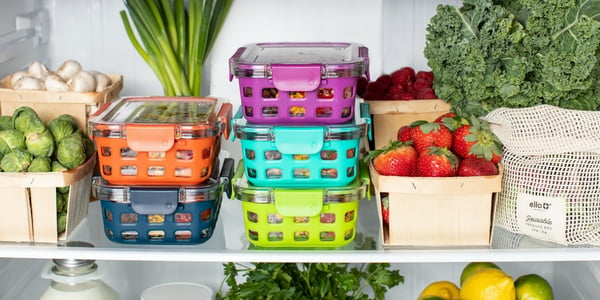Eating out is commonly one of the most enjoyable parts of our day. It can be a nice break from our...


Eating out is commonly one of the most enjoyable parts of our day. It can be a nice break from our...

The popularity of meal prep is steadily rising as more people become aware of its numerous...

For many, snacking has gone from just an occasional indulgence to a frequent habit that’s...

In recent years, the allure of the open road has captivated many, leading to a surge in RV travel....
14 Easy Ways to Waste Less Food
Whether to help save the earth or to help save your wallet, there are many reasons to make efforts to waste less food. We all feel a bit guilty when we throw out half of a deliciously prepared meal or when we find ingredients in the fridge that have already gone bad. Fortunately, there are simple steps you can take today to reduce your food waste!
Follow These Tips to Reduce Food Waste!
1. Limit Food Shopping
Limiting what you need and what you purchase helps ensure that what you buy is consumed wholly. Restricting your food shopping also lessens the burden on your fridge, keeping it organized and easier to go through when searching for a snack. When buying fruits and vegetables, make sure you buy the ones you will eat, not just those that look good. Remember, you need the nutrients more than the outlook of the fruit.
2. Plan Meals Wisely
One of the most effective ways to reduce food waste is to plan your meals in advance. Before heading to the grocery store, take inventory of what you already have on hand and make a list of the items you need. When planning meals, consider incorporating ingredients that can be used in multiple dishes to minimize the risk of spoilage. Additionally, try to use perishable items first and prioritize consuming leftovers before they go bad.
3. Proper Food Storage
There is no doubt that, sometimes, some food will be left over. The best way to ensure safe storage is to either freeze the food so you can eat it later or move the older food in the front and the new one in the back. This way, older food will be consumed sooner. By storing food, you are also looking out for your budget; the more food is stored, the less likely there is a need for unnecessary shopping.
4. Get Creative with Leftovers
Instead of letting leftovers go to waste, get creative in the kitchen and find new ways to repurpose them into delicious meals. Leftover vegetables can be turned into soups, stir-fries, or omelets, while leftover meats can be used in sandwiches, salads, or casseroles. Embrace the concept of "cooking once, eating twice" by intentionally preparing extra portions to enjoy as leftovers throughout the week.
5. Say "No" to Food Waste
Wasting food is never a good idea. Not only are you wasting the money you spend to buy that food, but you are also polluting the environment. One of the best habits you could implement in your daily life is to take the waste food and turn it into fertilizer for your plants. By doing so, you are helping plants get the best nutrients and thrive. If you can't eat it, at least it can still be used! Consider learning how to compost, and your extra food waste can be put to great use!
6. Local Production is the Future
When buying healthy and organic food, why go to an overpriced supermarket when you can go to the local market and get it straight from the farmer? Buying food from local farmers supports anti-food waste efforts by promoting fresher produce, minimizing transportation-related losses, and utilizing imperfect or surplus produce that would otherwise go to waste. Along with boosting economic growth, you are fighting against the pollution caused by carrier trucks and vehicles.
7. Share Your Leftovers
You may have heard the familiar phrase, “Sharing is caring.” Well, it’s true. If you have an excess of food, it’s better to share it with those who have none than to throw it out. In doing so, you will be helping those in need and have a moment of personal fulfillment. Donating to a local food shelf is a great option. However, you could also start a chain where you and your neighbors could share food, joining forces to combat food waste.
Jumpstart your savings today. Click here or the button below to open a TopLine Financial Credit Union savings account!
8. Practice Sustainable Eating Habits
Sustainable eating involves preparing quick and easy meals using fresh ingredients to minimize food waste. Opt for simple recipes like salads or stir-fries to use up ingredients before they spoil, and get creative with improvising meals to ensure nothing goes to waste. By adopting sustainable eating habits, you reduce food waste while enjoying nutritious meals without much effort.
9. Pack a Lunch When Going Out
Pack your lunch with the food you have at home when going out. There is nothing wrong with eating out and enjoying yourself with your friends, but try your best to make meals with the food you have at home when possible. The expiration date and sell-by date are two very different things. Eat food before it expires; the sell-by date is intended to warn you that you should eat it by a certain date.
10. Practice Portion Control
Overeating contributes to personal health issues and leads to unnecessary food waste—practice portion control by serving yourself smaller portions and going back for seconds if you're still hungry. Avoid loading up your plate with more food than you can comfortably eat, and be mindful of portion sizes when dining out or ordering takeout. Additionally, you can save money and resources in the long run by reducing food waste at an individual level.
11. Freeze Perishable Foods
If you find yourself with excess food you won't be able to consume before it spoils, consider freezing it for later use. Many fruits, vegetables, meats, and prepared meals can be safely stored in the freezer for several months. Invest in quality freezer-safe containers or bags and label them with the date and contents to keep track of what you have on hand. Freezing leftovers extends their shelf life and provides convenient options for quick and easy meals on busy days.
12. Compost Food Scraps
Despite our best efforts, some food waste is inevitable. Instead of throwing food scraps in the trash, where they will end up in a landfill, consider starting a compost bin or pile in your backyard. Composting is a natural process that breaks down organic matter into nutrient-rich soil that can be used to nourish gardens, lawns, and indoor plants. Composting food scraps can reduce methane emissions from landfills and close the nutrient loop by returning valuable nutrients to the soil.
13. Support Imperfect Produce
Many fruits and vegetables are discarded because they don't meet the aesthetic standards of consumers or retailers, even if they’re perfectly edible. Support initiatives that promote the sale and consumption of imperfect produce, such as "ugly" fruits and vegetables that may have cosmetic blemishes but are still perfectly edible. By embracing imperfect produce, you can help reduce food waste at the farm level and support farmers who work hard to produce nutritious food for our communities.
14. Donate Excess Food
If you find yourself with excess non-perishable items or unopened packaged goods you no longer need, consider donating them to local food banks, shelters, or community organizations. Many people struggle with food insecurity, and your donations can make a meaningful difference in their lives. Before donating, be sure to check with organizations to see what items they accept and any guidelines for donation.
Reducing food waste is a collective effort that requires individual action and systemic change. By implementing the practical tips outlined in this blog post, you can play a meaningful role in minimizing food waste in your own life and contributing to a more sustainable food system. Whether through meal planning, proper storage, creative cooking, or supporting initiatives that combat food waste, every small step makes a difference. Together, we can work towards a future where food is valued, not wasted.
Start earning cash back on your groceries. Click here or the button below to apply online for a TopLine Financial Credit Union credit card!
Living50+